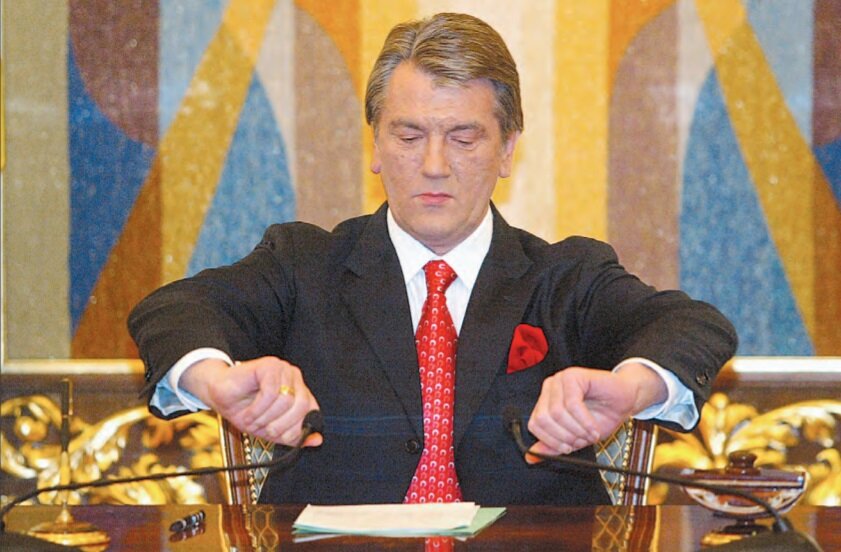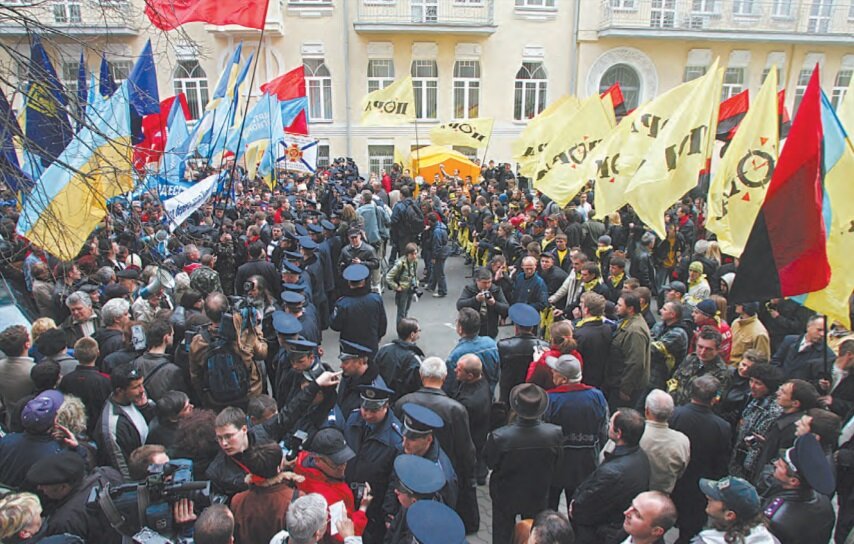Yushchenko’s current hand of cards includes his control of the military and Intelligence.
Downtown Kyiv is increasingly looking like a cheap remake of the 2004 Orange Revolution, but this time most of the impetus for the much smaller street demonstrations is coming from the east, in support of Prime Minister Viktor Yanukovych.
The 2004 showdown was finally settled through the combination of a compromise by President Viktor Yushchenko and a clear-cut court decision, but neither of these looks likely to help Yushchenko defeat his political nemesis now.
Yushchenko’s current hand of cards includes his control of the military and Intelligence Service, which together with personal resolve may return him the power and prestige he has let Yanukovych muscle away.
In the last two years since being swept into power, the pro-Western president has also lost most of his political and public support.
But on April 2, the president finally struck back, signing a decree to disband the government-controlled legislature and hold snap elections at the end of next month.
For its part, the government and the pro-Russian majority it controls in parliament have ignored the decree, releasing statements and resolutions that counter the president’s bold initiative, while appealing for a ruling from the nation’s feeble Constitutional Court.
Yushchenko announced his disbandment of the parliament to Ukrainians on national television April 2, justifying it by the “urgent need to preserve the state, its sovereignty and territorial unity.”
The president’s decree was preceded by the defection of around a dozen lawmakers from his once-powerful Our Ukraine faction, and Yulia Tymoshenko’s Byut faction, to the pro-government cocktail majority of Communists, Socialists and Yanukovych’s Regions party.
Yanukovych had publicly threatened to create a constitutional majority in parliament (300 of the parliament’s 450 seats), which would have deprived Yushchenko of his veto leaving him completely marginalized.

Ukrainian President Viktor Yushchenko declaring the dissolution of parliament April 2. Yushchenko signed a decree to send
lawmakers packing and called snap elections for May 27. The move came after the escalation of a months-long power struggle
between Yushchenko and Prime Minister Viktor Yanukovych, Yushchenko’s nemesis in the 2004 presidential elections and the
villain of the 2004 Orange Revolution. Yushchenko accused Yanukovych and his pro-Russian majority in parliament of illegally
recruiting members of the opposition into its ranks. Yanukovych has appealed to the Constitutional Court. (AP)
Now legal experts and Yanukovych’s governing coalition are challenging the president’s grounds for dismissing the parliament, and it’s not guaranteed whether the Constitutional Court will approve, cancel or refuse to rule on the decree.
However, the president had many other reasons to finally make a big move.
Yushchenko’s April 2 decree follows a long string of slights to the president, such as the firing of his pro-Western Foreign Minister Borys Tarasyuk, the government’s blocking of NATO membership initiatives and stalling on WTO aspirations.
Yushchenko has seen his executive authority chipped away ever since endorsing Yanukovych for premier last summer – an amazing comeback for the Donetsk strongman, who was demonized for his fraud-marred bid for the presidency during the Orange Revolution.
Even earlier, the president began alienating his Orange allies, starting with the dismissal of Revolutionary icon Yulia Tymoshenko, who had served as Yushchenko’s first premier. Then came the defection of Socialist leader Oleksandr Moroz, which allowed Yanukovych to form a majority in parliament.
Ironically, Tymoshenko has returned as one of the president’s most ardent allies, pushing harder than ever for new elections that promise to solidify her position as the country’s undisputed Orange, or pro-democratic, leader.
“The president has taken a manly step in the right direction,” she said after the announcement of the decree.
Reunited
Putting her past disagreements with Yushchenko aside, Tymoshenko said that her Byut Bloc and the pro-presidential Our Ukraine faction would be together in the fight to retake parliament.
“There will be a single format, which will allow all our political forces to work in full coordination … We will operate like a single team.”
Hailing from Ukraine’s Russian-speaking east but promoting a pro-Western policy, Tymoshenko could have the best chance of any Ukrainian politician to unite the country, with presidential elections only two years away. Yushchenko needs any ally he can get.
In the meantime, the fiery female politician is relentless in shaming her and Yushchenko’s political opponents in the eyes of Ukrainians.
This week, Tymoshenko focused on Socialist leader Moroz, who was made parliamentary speaker after joining Yanukovych’s coalition last summer.
In defiance of Yushchenko’s decree, Moroz has continued to hold parliamentary sessions without the participation of Byut or Our Ukraine.
“All the events now taking place in the Verkhovna Rada – I mean the holding of completely illegitimate sessions, simply go to show that for Mr. Moroz, the law and the Constitution never meant anything and that he has always only been interested in defending his position,” she told journalists on April 3.
Strategic posts
The most vocal supporters of the president during his ongoing standoff with the prime minister has been Defense Minister Anatoliy Hrytsenko, one of two Yushchenko appointees who remain in the Cabinet, and Central Electoral Commission chief Yaroslav Davydovych, who must hold repeat elections in record time under continuing intimidation from the government.
Yanukovych’s team has already ordered Davydovych to step down, and refused to fund the snap elections.
Yushchenko responded by ordering the National Security and Defense Council, which he has tried to make into an alternative to the Cabinet of Ministers in recent months, to find alternative funding.
Hrytsenko’s numerous public statements add to the perception that it’s the president who still controls the country as commander-in-chief of the armed forces.
But the coalition of eastern industrialists and leftists are playing their own cards, preaching democracy and compromise while stalling for more time to resume their wearing down of presidential authority.
“We must wait for a decision from the Constitutional Court, after which they can do anything they want to prepare for elections,” Yanukovych said during a government meeting on April 4.
“Until the issue is examined by the Constitutional Court, there will be no elections,” he emphasized.
Supporting the prime minister, in addition to most members of this Cabinet and the parliament, are the Prosecutor-General’s Office and most of the thousands of supporters who have descended on the capital from eastern regions.
The Interior Ministry reported on April 14 that around 4,500 demonstrators from all over Ukraine had arrived in the capital, where 425 tents have already been set up, near the parliament, presidential administration, and Independence Square.
Adding to the sense of legal apathy were reports on April 4 that the head of the Constitutional Court had tendered his resignation, which was rejected by his fellow justices.

Police lines separate two competing rallies of supporters, of Ukrainian Prime Minister Viktor Yanukovych, left, and opposition
activists, right, outside the office of Ukraine’s president in Kyiv April 4. President Viktor Yushchenko stood by his order
dissolving parliament and calling for early elections, as his standoff with the prime minister escalated. (AP)
The president’s camp was quick to blame the premier.
“This morning, Ukrainian Prime Minister Viktor Yanukovych had a personal conversation with the head of the Constitutional Court, Ivan Dombrovsky, demanding his resignation or the immediate passing of a decision on the unconstitutionality of the president’s decree,” reads a statement from Our Ukraine’s press service on April 4.
Enduring stalemate
Yushchenko and the defiant Yanukovych held a meeting April 3, the second day of the crisis. But both held firm in their positions setting the stage for a drawn-out battle.
“There are a lot of possible outcomes from this crisis, and many are dangerous,” according to Svetlana Kononchuk, an analyst at the Ukrainian Center for Independent Political Research.
For example, she said, the Constitutional Court could very well say that the appeals that it has been asked to review are beyond its remit, which would allow things to drag on further, playing into the hands of the parliamentary coalition, unless President Yushchenko presses ahead with elections.
If snap elections are held on the date set, May 27, only the larger parties are likely to get in, which will mean more polarization along the lines that already exist, Kononchuk said.
Yuriy Yakymenko, an analyst at the Razumkov Center for Economic and Political Studies, said Tymoshenko is likely to get the most votes among Orange parties, but will probably not receive more seats than the Regions party.
“Much will depend on what the Constitutional Court does and what takes place between now and then,” he added.
